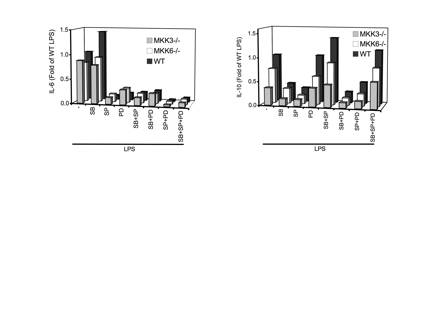Session Information
Session Type: Abstract Submissions (ACR)
Background/Purpose: p38 inhibitors have limited efficacy in rheumatoid arthritis (RA), possibly because p38 blockade suppresses IL-10 production and increases JNK and ERK phosphorylation in macrophages. This positive feedback mechanism elevates IL-6 levels and decreases IL-10 production. In contrast, bone marrow derived macrophages (BMDM) deficient in upstream p38 regulators (MKK3 or MKK6) have normal ERK and JNK responses and near normal IL-10 gene expression. The goals of this study were (1) to determine if dual ERK and JNK inhibition avoids reflex increases in pro-inflammatory cytokine expression and (2) to dissect the mechanisms of IL-10 regulation in MKK-deficient and p38 inhibitor treated BMDM.
Methods: Bone marrow derived macrophages from wild type (WT), MKK3-/- and MKK6-/- mice were pre-treated with p38 inhibitor SB203580 (SB), JNK inhibitor SP600125 (SP) and/or ERK inhibitor PD98059 (PD) and stimulated with LPS. Supernatant IL-6 and IL-10 levels were measured by immunoassay. IL-10 mRNA half-life was measured using LPS-stimulated BMDM treated with actinomycin D and qPCR. IL-10 promoter activity was determined in BMDM transfected with a mouse IL-10 promoter luciferase construct and normalized to a Renilla construct.
Results: We evaluated the role of JNK and ERK in BMDM IL-6 and IL-10 production. SB increased IL-6 production induced by LPS while SP and PD significantly reduced IL-6 levels in WT, MKK3-/-, and MKK6-/- cells (Figure 1, SP % inhibition: WT (91±1%), MKK6-/- (81±8%), and MKK3-/- (84±4%, n=3/group, p<0.008) (PD % inhibition: WT (85±3%), MKK6-/- (65±3%), and MKK3-/- (65±1%, n=3, p<0.02). SP or PD alone or in combination with SB reduced IL-6 production, indicating that blocking JNK and/or ERK overcame the pro-inflammatory effect of p38 inhibition. IL-10 levels were significantly reduced by SB in WT BMDM (62±9%), MKK6-/- (62±6%), and MKK3-/- (57±4%) (n=3/group, p<0.034). SP also inhibited IL-10 levels while PD had no effect. Surprisingly, the combination of SB and SP prevented the p38-mediated reduction in IL-10 production suggesting that JNK and p38 pathways have opposing effects on this cytokine. We then looked at the effect of SB and MKK-deficiency on IL-10 promoter activity in BMDM treated with LPS. IL-10 promoter activity in WT cells was reduced by 43±6% by SB (n=3/group, p=0.02). However, MKK3- and MKK6-deficient cells had normal promoter activity, indicating that IL-10 transcription is not impaired in MKK-deficient cells. IL-10 mRNA half-life was unaffected by MKK-deficiency or SB-treatment in LPS-stimulated BMDM.
Conclusion: Increased JNK and ERK activation, along with suppressed IL-10 production contribute to the pro-inflammatory effects of p38 inhibition in BMDM. Combining a p38 inhibitor with a JNK inhibitor might be more effective than a selective p38 inhibitor by preserving anti-inflammatory responses and blocking the reflex pro-inflammatory response.
Disclosure:
D. Hammaker,
None;
K. Topolewski,
None;
M. Guma,
None;
D. L. Boyle,
None;
G. S. Firestein,
None.
« Back to 2012 ACR/ARHP Annual Meeting
ACR Meeting Abstracts - https://acrabstracts.org/abstract/differential-regulation-of-cytokines-by-extracellular-signal-regulated-kinase-and-c-jun-n-terminal-kinase-in-map-kinase-kinase-3-and-6-deficiency/

